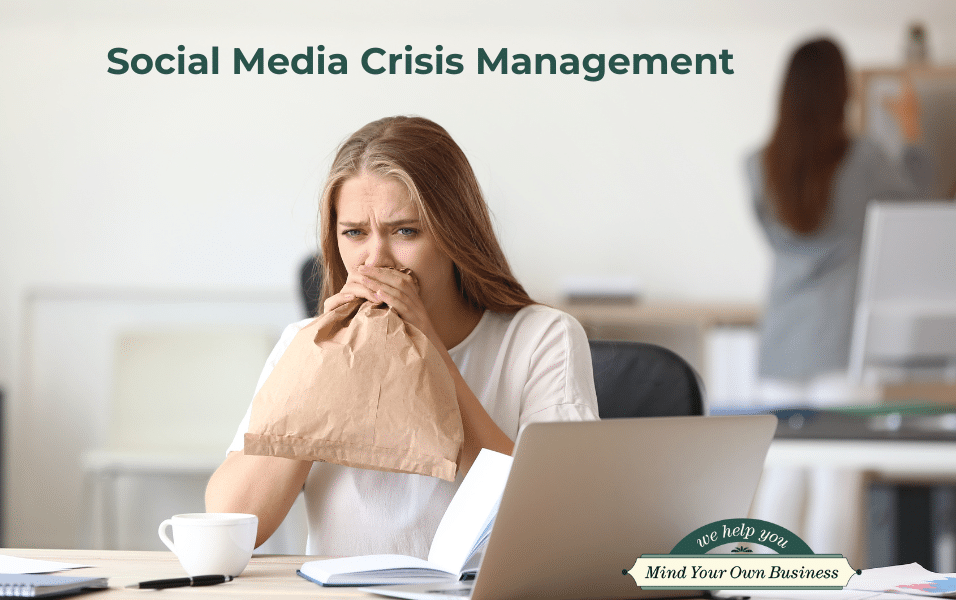Running a small business is a whirlwind, isn’t it? You’re juggling everything from inventory to customer service. However, one aspect of running a small business that often gets overlooked is social media crisis management. Social media has become this incredible tool to connect with your audience and grow your brand. But what happens when online interactions become negative? What if a negative comment goes viral, or a customer complaint escalates publicly? That’s where social media crisis management comes in, it’s something every small business owner needs to think about… even if you think “it won’t happen to me.”
We often see big brands in the news for social media blunders, but the truth is, small businesses are just as vulnerable, and sometimes even more so. A single misstep online can have a significant impact on your reputation and your bottom line. A recent study showed that 94% of consumers say a bad review has convinced them to avoid a business. That’s a significant chunk of potential business you could lose!
Now, you might be thinking, “Okay, I get it, it’s important. But what can I do? I don’t have a huge PR team.” And that’s exactly what we’re going to talk about. Most articles on this topic will tell you to have a plan and watch your channels (which is good advice!), but let’s dig a little deeper into some things you might not have considered.
Understanding Social Media Crisis Management Strategies for Small Businesses
One crucial aspect that is often underestimated in social media crisis management for small businesses is the need for clear internal communication. When a potential crisis hits, do your employees know who to talk to? Do they understand the company’s stance on the issue? Having a clear internal protocol is essential. Imagine a customer posting a scathing review. If your sales team, your customer service reps, and your social media manager aren’t on the same page about how to respond (or even if they should respond immediately), it can lead to confusion and a mishandled situation. Name an individual or small team to manage crisis communications and ensure everyone else knows to direct inquiries to them.
Another underappreciated element is the human touch. In the heat of a social media storm, it’s easy to get defensive or rely solely on pre-approved statements. But remember, your audience is made up of individuals. Acknowledge their concerns, empathize with their frustration, and show that you’re genuinely listening. A personalized response, even if it’s just acknowledging their comment and saying you’re looking into the matter, can go a long way in de-escalating a situation. According to Invesp’s recent statistics and trends infographic, 71% of consumers who have had a positive experience with a brand on social media are likely to recommend the brand to their friends and family. Turning a negative into a positive is possible!
Preparing Your Small Business for Social Media Crises
So, how can you prepare for the unexpected? Here are a few tips tailored for small businesses:
- Find Potential Trigger Points: Think about what could realistically go wrong in your business. Could it be a product issue, a service problem, or an employee sharing a controversial opinion, even on their personal social media? Brainstorming these scenarios will help you prepare potential responses and identify who needs to be involved.
- Create a Basic Response Framework: You don’t need a 50-page crisis communication plan, but having a basic framework with key messages for different scenarios can save you valuable time and prevent you from saying the wrong thing in the moment. This framework should include guidelines on tone, who should respond, and when.
- Practice Active Listening (Beyond Monitoring): Don’t just passively check your social media. Actively listen to what your customers are saying, both positive and negative. Understand the sentiment around your brand and identify potential issues before they blow up. Tools can help with this, but sometimes simply scrolling through comments and engaging authentically can offer valuable insights.
- Develop Empathy Statements: Prepare some general statements to have on hand that demonstrate your understanding and respect for customer emotions. Phrases like “We understand your frustration” or “We’re sorry you had this experience” can be incredibly powerful in diffusing anger.
- Know When to Take the Conversation Offline: Not every issue needs to be resolved publicly. If a situation is becoming heated or involves sensitive personal information, offer to take the conversation offline via direct message or phone call.
Over to You
At MYOB, we understand the challenges small business owners face in managing their online presence. Our team specializes in monitoring your social media channels, engaging with your audience, and even scheduling posts. This frees up your time to focus on other critical aspects of your business and be prepared for those unexpected social media emergencies.
Remember, a social media crisis doesn’t mean the end for your brand. With careful preparation, a thoughtful approach, and a genuine commitment to your customers, you can navigate these challenges effectively and even strengthen your reputation in the long run. What steps will you take today to better prepare your small business for a potential social media crisis?
Written by: Jennifer Hanford, MYOB Blogger

